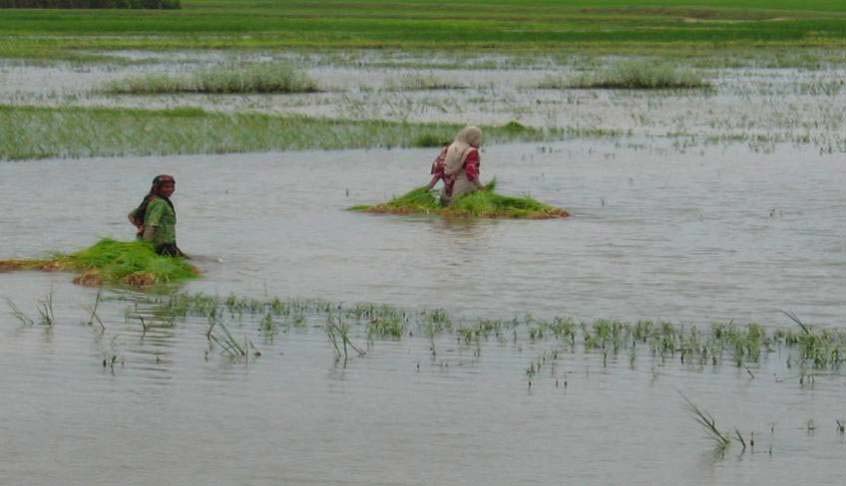Government Programmes
Aquifer management approach towards utilisation of groundwater resources- a debate
Posted on 18 May, 2009 04:18 PMThis paper published in the Economic and Political Weekly dwells on the groundwater management debate and makes suggestions for developing a viable approach to sustainable and equitable management of groundwater in India.
Annual flood misery in north Bihar - presentations by Megh Pyne Abhiyaan
Posted on 12 May, 2009 04:30 PM These three sets of presentation by Eklavya Prasad, Practitioner, Natural and Social Resource Management have been summarized below -
These three sets of presentation by Eklavya Prasad, Practitioner, Natural and Social Resource Management have been summarized below -
Bihar’s flood survival mechanisms
The Parthasarathy committee report by technical committee on watershed programmes in India (2006)
Posted on 12 May, 2009 02:47 PMThe Parthasarathy Committe was a Technical Committee on DPAP, DDP, IWDP Programmes constituted by the Department of Land Resources, Ministry of Rural Development (MoRD) in 2006 and its report has attempted an exhaustive review of the experience of the watershed programme in India.
Reorienting watershed development programme in India – an occasional paper
Posted on 12 May, 2009 01:17 PMThis report by FoRWARD deals with the reorientation of the watershed development programme in India. The government is apparently committing larger resources for watershed development and plans to bring most of the dryland, degraded lands under the coverage of the programme over the next 25 years or so.
Watershed development programmes in Madhya Pradesh: present scenario and issues for convergence
Posted on 12 May, 2009 12:40 PMThis report by Forum for Watershed Research and Policy Dialogue (FoRWARD) attempts to look at the present status of watershed development in the State of Madhya Pradesh so as to be able move towards a vision of better convergence across developmental objectives (including equity), synergy between natural resource regeneration, administrative co- ordination, institutional coherence, and resource mobilization. It is in this larger context, the review focuses is on (a) spatial spread, prioritization, and complementarity across projects; (b) comparison across modes/ approaches and cross learning; and, (c) issues for future policies.
Water issues faced in Hyderabad metropolitan city - A presentation by Hyderabad municipal water supply and sewerage board
Posted on 12 May, 2009 12:36 PMThis presentation by M G Gopal of the Hyderabad Metropolitan Water Supply and Sewerage Board deals with the water issues faced in the city. The issues presented include – (a) Inter-sectoral allocation (b) Meeting the demand (c) Maintaining quality standards (d) Reducing unaccounted for water (e) Recycle and reuse (f) Promoting rainwater and conservation (g) Implementation of CDS and (f) Is ‘privatisation’, a solution or a disaster?
Watershed development in Maharashtra: present scenario and issues for restructuring the programme
Posted on 12 May, 2009 12:31 PMThe report on “Watershed Development in Maharashtra” by Society for Promoting Participative Ecosystem Management (SOPPECOM) ), on behalf of the Forum for Watershed Research and Policy Dialogue (ForWaRD), deals with the present scenario and issues for restructuring the programme. The concept of integrated and participatory watershed development and management has emerged as the cornerstone of rural development in the dry and semi-arid regions of India. Over the years the country has been making increasing investments in this area with the objective of enhancing the production potential of rainfed agriculture.
Memorandum: Scrap Renuka dam project
Posted on 12 May, 2009 11:25 AMForwarded to the Portal by: Himanshu Thakkar, SANDRP
Submission Sent to Prime Minister, DJB, Ministry of Water Resources & HP Govt.
A memorandum demanding the scrapping of the proposed Renuka Dam Project in Sirmaur, Himachal Pradesh was sent to the Prime Minister, Union Minister of Water Resources, the Delhi Jal Board, the Central Water Commission and the Ministry of Social Justice today by concerned environment groups as well as representatives of the dam affected communities. The 5 page detailed submission has made this demand on three basic grounds - technical/conceptual issues, environment implications and the social impacts of the project. Attacking the very root and concept of the project the memorandum highlights the point that the agreement that was signed in May 1994 is no longer valid, as per the opinion of the Union Ministry of Law and Justice, since Rajasthan, one of the parties, did not sign the agreement. The Delhi Jal Board has admitted in response to an RTI application that no options assessment has been done to arrive at the least cost option before taking up the Renuka dam proposal. Without such an assessment, taking up a proposal like the Renuka dam would be completely wrong and inappropriate use of public resources. Moreover, several Studies have proved that Delhi itself is thirsty not because there is shortage of water but actually due to mismanagement and misappropriation of water. According to the Performance Audit report of the Delhi Jal Board for 2008, Delhi has distribution losses of 40 per cent of total water supply which is abnormal and significantly higher than the acceptable norms of 15 per cent prescribed by the Ministry of Urban Development.
National rural employment guarantee act (NREGA) - a watershed works manual by Samaj Pragati Sahayog
Posted on 11 May, 2009 02:46 PMThis Watershed Works Manual for the National Rural Employment Guarantee Act (NREGA) programme was prepared by Samaj Pragati Sahayog at the request of the Union Ministry of Rural Development. It is meant for those individuals and organisations who will be involved in planning, implementing and/ or monitoring NREGA.
Training module on water quality monitoring and surveillance by Rajiv Gandhi National Drinking Water Mission
Posted on 01 May, 2009 02:05 PMTraining module at block level





